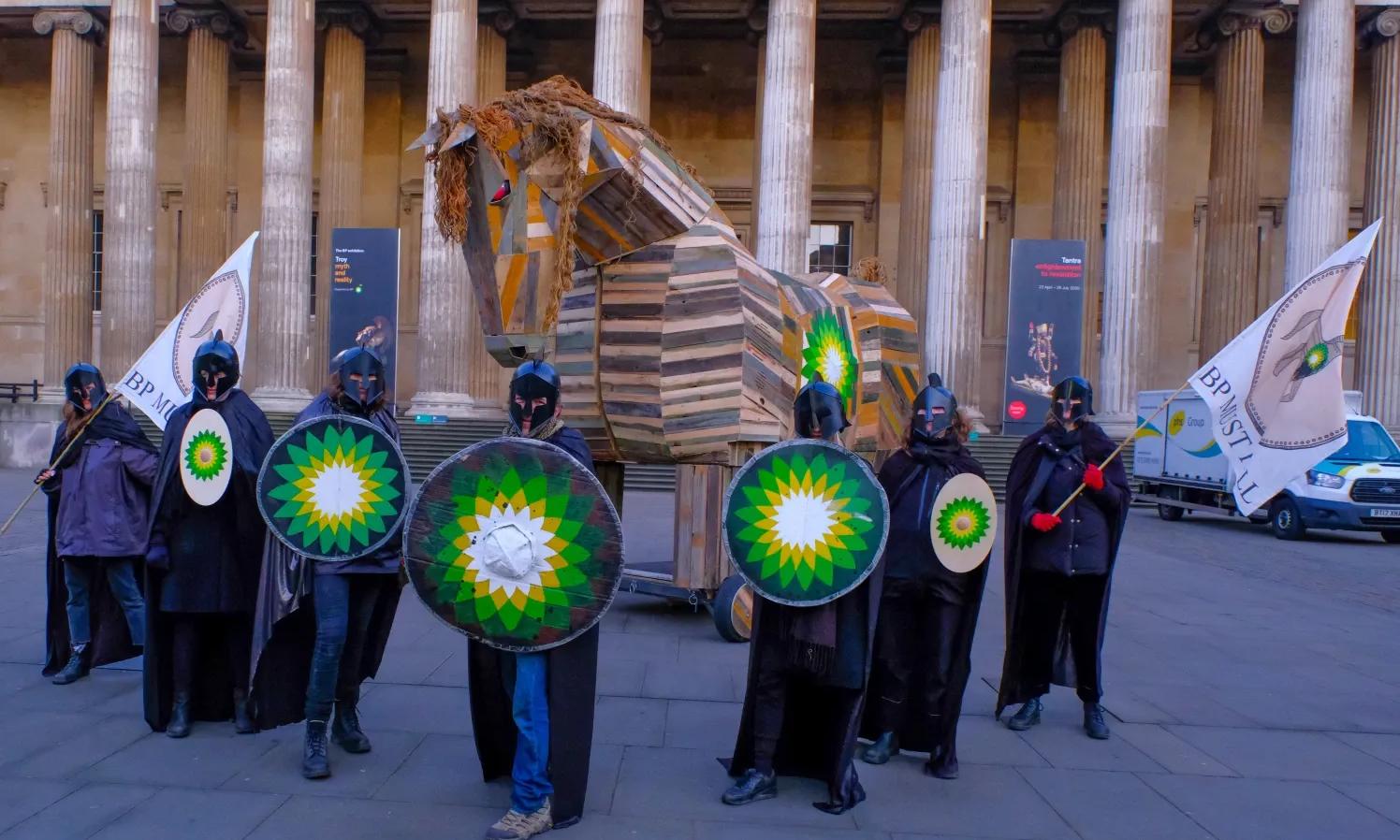Protestors stand in front of the British Museum with a “trojan horse”
Photo: Hugh Warwick. Courtesy of BP or not BP?
Last week, five climate activists, the “Whole Truth Five”, were given record prison sentences for their part in allegedly organising a protest on the UK's M25 motorway against the granting of new oil and gas licenses.
The group had been found guilty of conspiracy to cause a public nuisance for the demonstration, which took place in November 2022.
The sentences have been widely criticised for their disproportionate length, including in an open letter to the Attorney General signed by a range of public figures.
This week, Phoebe Plummer and Anna Holland were found guilty of criminal damage after throwing soup at Vincent van Gogh’s Sunflowers (1888) the month before. They will be sentenced on 27 September.
Phoebe Plummer and Anna Holland outside Southwark Crown Court
Courtesy: Just Stop Oil
In both trials, the court has not accepted fears over the climate collapse as justification for the disruption. The motivations of the protestors, said the judge at Plummer and Holland’s trial, was no defence against the allegations they faced. He added that evidence relating to the climate crisis would be “constricted” at trial, and that the fact that the world has exceeded the safe level of 1.5°C for 12 consecutive months was “neither here nor there”.
For years the oil industry and its political supporters, as well as those bent on undermining protest against fossil fuels, have being telling only half the story. The tragic history of misinformation and denial are well documented in Jane McMullen’s award-winning documentary Big Oil v. The World (2022). The refusal to acknowledge the realities of climate collapse and ecological breakdown on the part of oil companies has undoubtedly influenced public opinion—as have the often violent and punitive reactions to those trying to raise the alarm.
Disruption on the M25 in London following Just Stop Oil’s protest in 2022
Courtesy of Just Stop Oil
Such an apparently one-sided view of “Big Oil”’s role in society can arguably be perceived within our public institutions. Nicholas Cullinan, the new director of the British Museum (BM), gave his full support to the controversial renewal of BP's sponsorship of the British Museum (an agreement reached before he took up his role) when speaking to BBC Radio Four’s Today programme last week. BP have been dropped as a sponsor by numerous cultural institutions, including the National Portrait Gallery when Cullinan was the director at that institution.
Speaking for the BM, Cullinan says that there have been no major protests against BP sponsorship, and that polling shows it is supported by the majority of the British public. The data to which he refers is a survey conducted in May 2023 in which 59% of around 3,000 people answered “yes” to the statement “It is acceptable for a museum to accept large donations from big oil and gas companies”. The survey also says, however, that only around 30% of people think that the source of museum funding matters. These statistics might be interpreted, therefore, not as strong opinions but rather indifference and/or lack of knowledge about the urgency of climate collapse and the role played by fossil fuels.
Protestors gather in the British Museum’s Great Court in 2022
Photo: BP or not BP?
As for protests, the museum has in the past taken the decision to close its doors, and on one occasion bring in the police in response to peaceful, constructive demonstrations. As Isabel Tarr, from the campaign group Culture Unstained says, the museum cannot have it both ways—both understating and overstating the impact of the demonstrations.
The belief that “bad” private money is, by some miraculous alchemy, transformed into “good” public money—as sponsorship can sometimes make it appear—is certainly open to question. It is not abstract “money” but reputations that are being laundered. The sponsorship from BP of £50m over ten years (a paltry amount for BP, and a very small fraction of the amount that the chair of the BM, George Osborne, will likely need to raise for the extensive redevelopment of the museum) is essentially a payment for reputation enhancement. Payment from a company, it might be added, that under its new chief executive officer has announced downgrading renewable energy projects and increasing acquisitions in oil and gas to attract investment.
It is true that the ongoing squeeze on public finance means that private sponsorship has to play a role in museum funding. Such deals are part of a much wider picture in which whole sectors of the economy, public institutions and companies, have been transferred to the private sector.
It is therefore also entirely justifiable to argue that the problem is systemic, and that it is unfair to single out an institution that otherwise plays such a vital role in public life.
And yet the British Museum is an institution devoted to the preservation of our human heritage. Nobody who accepts the drastic urgency of climate breakdown and the likely future awaiting young people could find the presence of BP in its spaces—on its catalogues—anything other than profoundly contradictory and deeply problematic.
If you take this urgency out of the equation and present only half the story, then the actions of climate protestors, blocking roads and throwing soup on the glazing over paintings, might seem fanatical, and worthy of punishment; just as, at a distance, big oil sponsorship of public institutions might seem perfectly acceptable.
And yet, despite the best efforts of lobbyists and denialists, the whole truth of climate collapse is increasingly impossible to ignore. We can no longer shirk responsibility—and should show understanding towards those who bravely take it on.

